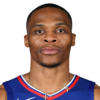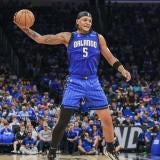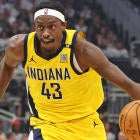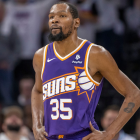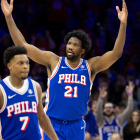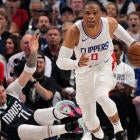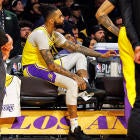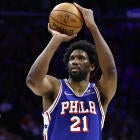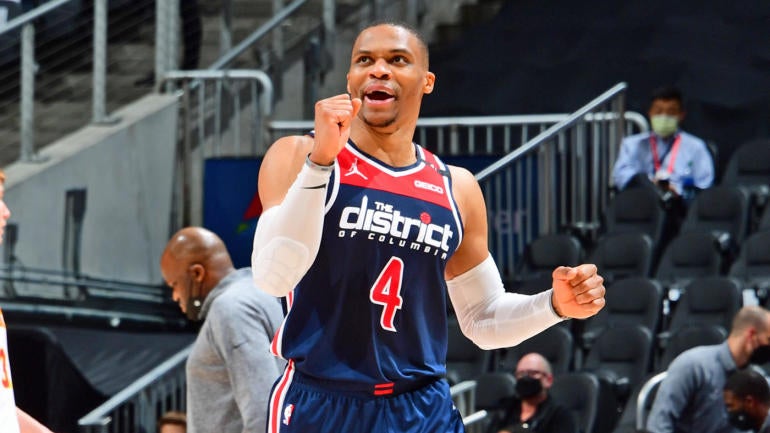
The Washington Wizards have traded Russell Westbrook and second-round picks in 2024 and 2028 to the Los Angeles Lakers for Kyle Kuzma, Kentavious Caldwell-Pope, Montrezl Harrell and the No. 22 overall pick, according to The Athletic's Shams Charania. It was reported Thursday that Westbrook wanted a trade and Los Angeles was his preferred destination.
Earlier Thursday, ESPN's Adrian Wojnarowski reported that Harrell would opt into the final year of his contract at $9.7 million. The Lakers needed Harrell to opt-in for salary purposes in a possible trade. Westbrook is set to make over $44 million next season, so every penny counts in getting up to his figure. Kuzma, Caldwell-Pope and Harrell combine to make almost $36 million.

CBS Sports HQ Newsletter
Your Ultimate Guide to Every Day in Sports
We bring sports news that matters to your inbox, to help you stay informed and get a winning edge.
Thanks for signing up!
Keep an eye on your inbox.
Sorry!
There was an error processing your subscription.
The Wizards still reportedly plan to keep Bradley Beal, according to Wojnarowski. The idea for them would be to create future flexibility to retool the roster around him. Beal can become a free agent next offseason.
On paper, Westbrook is an odd fit in Los Angeles. The Lakers ranked 24th in 3-point attempts and 21st in 3-point percentage last season. Westbrook is a notoriously poor 3-point shooter. He has made only 30.5 percent of his attempts in his career, further limiting spacing for LeBron James and Anthony Davis as they drive to the basket. That was already a problem over the past two seasons.
But the Lakers have been desperately searching for a secondary playmaker to help take ball-handling pressure off of James. Westbrook has led the NBA in assists in three of the past four seasons. He may not be a shooter, but he's a dynamic scorer that will make the Lakers even deadlier in transition and on the glass. That makes him an imperfect and risky addition, but one with a good deal of upside.
Westbrook is a Los Angeles native. He played collegiately at UCLA. The Lakers would be his fourth team in the past four seasons, but they are probably his best chance at winning a championship. With that in mind, let's grade this trade.
Lakers receive:
- 2024 second-round draft pick
- 2028 second-round draft pick
Wizards receive:
- No. 22 pick in 2021 NBA Draft
Lakers trade grade: C
If the Lakers were getting the MVP version of Westbrook from four seasons ago, this trade might make more sense. Even during the 2019-20 season as a member of the Rockets, he attempted 10.5 shots per game in the restricted area. He fell to only five per game last season. He fell from 4.8 fast break points per game as a Rocket to 2.7 last season in Washington. This suggests one of two things, neither of which are particularly favorable to the Lakers: either Westbrook's athleticism has declined a bit with age, or he needs truly optimal spacing to thrive at this stage of his career.
The truth is a little bit of both, and that doesn't bode well for a Los Angeles team that does not have optimal spacing to put around Westbrook or a time machine to de-age his declining body. The version of Westbrook that the Lakers are getting is the one that took over six mid-range shots per game last season and barely made 38 percent of them. Those are the exact types of shots teams with LeBron James tend to avoid. He is perhaps the single greatest creator of 3-pointers for teammates in NBA history. That has typically created a symbiotic relationship between James and his role players: he creates 3-pointers for them, and they, in turn, draw defenders out of the paint and away from him.
Westbrook won't do that. The Lakers know that well. When they played the Rockets in the 2020 postseason, they won by essentially ignoring Westbrook off of the ball. They doubled James Harden frequently knowing that Westbrook, a 30.5 percent 3-point shooter for his career, couldn't punish them from behind the arc. Teams will do the same thing to them in an effort to slow down James or Davis from behind the arc. That is the fundamental flaw in this trade. Everything the Lakers do offensively should be built around enhancing James and Davis. At best, Westbrook handling the ball means that James and Davis aren't. At worst? He actively hinders them through his inability to shoot 3-pointers.
Those are the negatives, and they are numerous, but that doesn't mean there aren't theoretical benefits here. The Lakers ranked first in the NBA in points per 100 possessions added in transition during their championship season in 2020. They fell to 19th last season. Injuries were a part of that, but the Lakers clearly weren't as strong in transition even at full strength. Even a declining Westbrook is a substantial upgrade in that regard. Houston rose from 19th to ninth in fast-break points per game after adding Westbrook. The Lakers will be lethal when they run. They'll also be lethal on the glass. Westbrook's 11.5 rebounds per game last season outpaces even Davis during his two Lakers seasons.
Most importantly, the move is an acknowledgment of James' mortality. He is 36. The Lakers know that they cannot ask him to run the entire offense for 82 games and 20-25 playoff games next season. Their offense has fallen off of a cliff when he's gone to the bench ever since he signed in 2018. The Lakers hope that Westbrook can fix that and allow James more rest within games and likely, more nights off as a whole. Whether or not that will materialize is debatable. Both Houston and Washington struggled mightily when Westbrook played without Harden and Beal, respectively. But neither of those teams could pair him with Davis in those minutes. This is the most talented team Westbrook has ever played for. If any group is capable of sanding some of the rougher edges off of his game, it's the one that won a championship two years ago without him.
Davis will ultimately be the key to the success or failure of this move. He has to play center for Westbrook to be viable in Los Angeles. The Lakers simply cannot muster enough shooting to justify the move otherwise. He's done so in the playoffs, but the regular season is another story. Expect the Lakers to live off of transition offensively but struggle in the half-court just as they did in 2020. They won the championship that season. They're hoping that they can rely on the same formula with Westbrook next year.
Wizards trade grade: B+
There are two scenarios we need to consider when it comes to Washington's future. The less likely outcome is that Bradley Beal stays in Washington for the long haul. Through that lens, the Wizards probably took a slight step back in the short term. Westbrook averaged 22.2 points per game and he created another 30.1 per game through assists. That's 52.3 points that are suddenly unaccounted for every night, and it's unclear who on this roster can replace them. Kuzma can increase his scoring volume in a bigger role, and Caldwell-Pope gives them sorely needed perimeter defense, but without further moves, Beal just doesn't have enough help on offense right now.
That would scare most teams trying to re-sign a player of Beal's caliber. Downgrading in the year before he becomes a free agent doesn't send a great message to a player who seemingly wants to win. But ESPN's Ramona Shelburne reported that Beal and Westbrook were in constant communication this offseason and that Beal supported him in seeking out a better situation for himself. All reports now point to Beal staying in Washington for the time being. The Wizards would not have made this move without Beal's approval. If they got it, they created meaningful flexibility to improve around him down the line.
Harrell's contract expires after next season. Caldwell-Pope has less than $5 million guaranteed after next season. With Westbrook's gargantuan salary gone, even with Kuzma in the fold, the Wizards could create up to $30 million in extra space next offseason to try to supplement Beal. What they'll do with that flexibility remains to be seen, but remember, even with Westbrook, the Wizards barely made the playoffs. They didn't have a roster worth keeping together. Now, they have the freedom to possibly build a better one. Adding an extra first-round pick, which has reportedly been rerouted to the Indiana Pacers in exchange for Aaron Holiday, is the icing on the cake.
But really, we have to acknowledge that Beal probably isn't going to be here for the long haul. If that's the case, getting off of the remaining $91 million on Westbrook's contract is a godsend on a number of levels. It obviously creates more financial flexibility for them to reshape the roster, but it also enables them to tank properly if that is the path that they want to take. Westbrook may limit an offense's ceiling in the playoffs, but in the regular season, he raises the floor high enough to keep a team out of the top of the lottery. His teams tend not to lose many regular-season games.
If Washington wants to seek out more of a win-now package for Beal, Westbrook's absence also makes it easier for them to ignore fit concerns. Take Ben Simmons, for example. The Wizards couldn't have rebuilt around him with Westbrook in place because neither of them can shoot 3s. With Westbrook gone, Philadelphia is suddenly a viable suitor. If nothing else, that creates leverage Washington can use against other teams.
As accomplished as Westbrook is, nothing about what happened in Washington last season suggested that the Wizards had a sustainable contender. They only would have gotten worse as Westbrook continued to age. Washington managed to hit the eject button and collect some good assets in the process. No matter which direction they go in, their future is brighter than it was last season.







